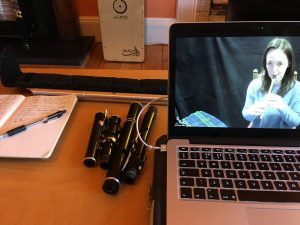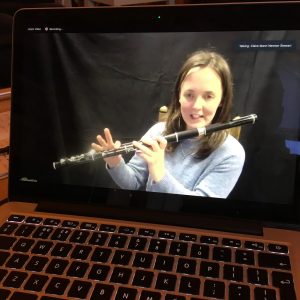FluteFling Online with Tom Oakes 22-24 April 2021
In April 2021 the second FluteFling Online event took place, with a weekend curated by Tom Oakes featuring an online concert, workshops and a masterclass. Finally, I have managed to complete writing it up.
Following the success of the first FluteFling online workshops with Clare Mann in December 2020, the team were keen to try to mark the Edinburgh weekend that was cancelled at the beginning of the pandemic in April 2020. Tom Oakes had been due to perform that weekend, so it was natural to approach him.
After exploring a few options together the outcome was a core series of four workshops over two days, with an additional multi-location concert on the Friday night. The weekend finished with a masterclass from Tom on using the keys on keyed flutes for traditional music, an aspect of the music performance which is often overlooked. Delivered via Zoom, the main workshops were recorded to allow access across different time zones, a popular decision that we carried over from our previous event.
Despite the beginning of the easing of some lockdown restrictions, cumulative screen fatigue, better weather and improving daylight hours, numbers were very healthy. 35 people attended the evening concert, 38 attended the workshops and 21 attended the masterclass. This still compared favourably with previous in-person events and has encouraged FluteFling organisers to consider including online access in the future, regardless of circumstances.
Friday night concert
The Friday concert was informal and international, featuring Tom Oakes (Edinburgh) who had invited Aoife Granville (County Kerry, Ireland), Philippe Barnes (London) and Kirsi Olja (Finland) on a variety of flutes, whistles and recorders. The musicians played solo from their homes but there was engaging crossover chat and conversation about music, instruments and traditions, ending in questions from the global online audience.
Technology didn’t let us down and the audience at home enjoyed a journey with flutes across Europe. Aoife Granville’s music from Kerry included punchy and spirited traditional fife tunes that resonated with Scottish traditions. Her performance also referenced her project that celebrates the pioneering contributions of women to Irish traditional flute music. You can watch a video on that topic on YouTube.
The Boehm system flute is becoming better understood in traditional music and Philippe Barnes showcased a fine range of driving tunes and slower pieces with tone and colour more associated with wooden flutes. He also played a simple system wooden flute and introduced us to a richly sonorous Boehm alto. Philippe is a multi-instrumentalist who also plays the uillean pipes, his fingered articulation carries over from them effortlessly. A personal highlight was a slow air that I failed to make a note of, so I’ll have to try and catch him again.
The music of Finland is not necessarily well-known in Scotland and Kirsi Olja introduced us to traditional airs and dance music on recorders and end-blown flutes that invite us all to learn more. However, her improvisational singing while playing primitive fipple flutes with bark intact was as elemental and arresting as it was unexpected.
Weekend workshops and masterclass
The workshop formats of Saturday and Sunday morning and afternoon sessions worked to allow everyone screen breaks and keep things fresh. From his studio in a 17th Century building in Leith, the old port for Edinburgh, Tom took us through a wide range of tunes for all tastes. These included The Keilder Schottische and Matt Seattle’s The Four Winds — Borders tunes from his time living in Newcastle, while the pipes jig The Snuff Wife and Hamish the Carpenter from Cape Breton reflected more his time in Edinburgh and Glasgow sessions. The vibrant contemporary folk scene in Scotland often features more modern tunes that play on traditional themes and Tom also treated us to one of his own compositions.
As if that wasn’t enough, the weekend finished with a Masterclass from Tom. Initially focusing on the use of keys on keyed flutes in traditional music, he also covered tuning, embouchure and ergonomics, tone, flute design and the differences between historical flutes and contemporary models used in traditional music.
With so much covered, there was something for everyone to take away and explore. Thanks again to Tom for taking it on and keeping the energy levels going. Thanks too to Pete Saunders who manned the decks admirably and kept the technology running smoothly. Not to forget the FluteFling team who worked in the background and were on hand to assist when called upon.
It has taken me a while to get around to writing this up, but Tom has been working hard. He has a new album coming out as I write. By popular demand his solo flute outing, entitled Water Street, is available for pre-order. See his website for more details: https://www.tomoakesmusic.com
Update: Tom’s album has launched and can be ordered or downloaded from Bandcamp.





